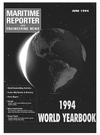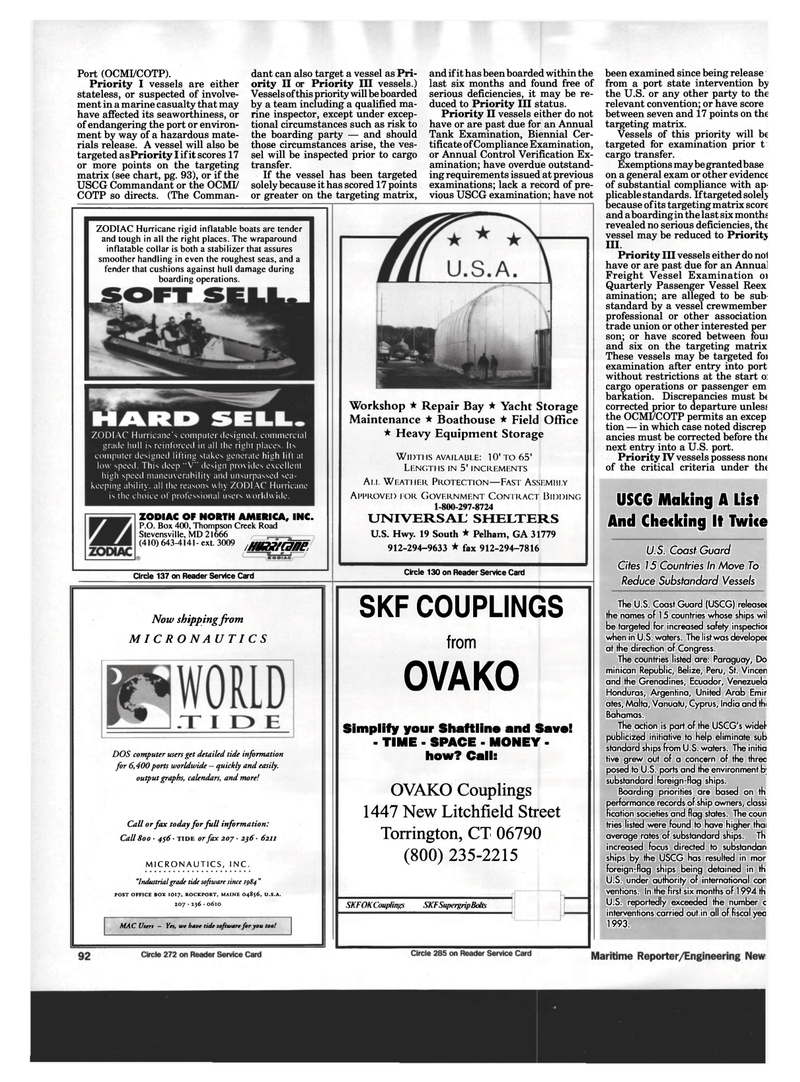
Page 82: of Maritime Reporter Magazine (June 1994)
Read this page in Pdf, Flash or Html5 edition of June 1994 Maritime Reporter Magazine
Port (OCMI/COTP).
Priority I vessels are either stateless, or suspected of involve- ment in a marine casualty that may have affected its seaworthiness, or of endangering the port or environ- ment by way of a hazardous mate- rials release. A vessel will also be targeted as Priority I if it scores 17 or more points on the targeting matrix (see chart, pg. 93), or if the
USCG Commandant or the OCMI/
COTP so directs. (The Comman- dant can also target a vessel as Pri- ority II or Priority III vessels.)
Vessels of this priority will be boarded by a team including a qualified ma- rine inspector, except under excep- tional circumstances such as risk to the boarding party — and should those circumstances arise, the ves- sel will be inspected prior to cargo transfer.
If the vessel has been targeted solely because it has scored 17 points or greater on the targeting matrix, and if it has been boarded within the last six months and found free of serious deficiencies, it may be re- duced to Priority III status.
Priority II vessels either do not have or are past due for an Annual
Tank Examination, Biennial Cer- tificate of Compliance Examination, or Annual Control Verification Ex- amination; have overdue outstand- ing requirements issued at previous examinations; lack a record of pre- vious USCG examination; have not been examined since being released from a port state intervention by the U.S. or any other party to the relevant convention; or have scored between seven and 17 points on the targeting matrix.
Vessels of this priority will be targeted for examination prior tc cargo transfer.
Exemptions may be granted based on a general exam or other evidence of substantial compliance with ap- plicable standards. If targeted solely because of its targeting matrix score and a boarding in the last six months revealed no serious deficiencies, the vessel may be reduced to Priority
III.
Priority III vessels either do no1 have or are past due for an Annual
Freight Vessel Examination oi
Quarterly Passenger Vessel Reex amination; are alleged to be sub- standard by a vessel crewmember professional or other association trade union or other interested per son; or have scored between foui and six on the targeting matrix
These vessels may be targeted foi examination after entry into port without restrictions at the start oi cargo operations or passenger em barkation. Discrepancies must be corrected prior to departure unless the OCMI/COTP permits an excep tion — in which case noted discrep ancies must be corrected before the next entry into a U.S. port.
Priority IV vessels possess none of the critical criteria under the
USCG Making A List
And Checking It Twice
U.S. Coast Guard
Cites 15 Countries In Move To
Reduce Substandard Vessels
The U.S. Coast Guard (USCG) releasee the names of 15 countries whose ships wil be targeted for increased safety inspectioi when in U.S. waters. The list was developee at the direction of Congress.
The countries listed are: Paraguay, Do minican Republic, Belize, Peru, St. Vincen and the Grenadines, Ecuador, Venezuela
Honduras, Argentina, United Arab Emir ates, Malta, Vanuatu, Cyprus, India and thi
Bahamas.
The action is part of the USCG's wide! publicized initiative to help eliminate sub standard ships from U.S. waters. The initio tive grew out of a concern of the three posed to U.S. ports and the environment b; substandard foreign-flag ships.
Boarding priorities are based on th performance records of ship owners, classi fication societies and flag states. The coun tries listed were found to have higher thai average rates of substandard ships. Th increased focus directed to substandari ships by the USCG has resulted in mor foreign-flag ships being detained in th
U.S. under authority of international con ventions. In the first six months of 1994 th
U.S. reportedly exceeded the number c interventions carried out in all of fiscal yeo 1993.
ZODIAC Hurricane rigid inflatable boats are tender and tough in all the right places. The wraparound inflatable collar is both a stabilizer that assures smoother handling in even the roughest seas, and a fender that cushions against hull damage during boarding operations.
ZODIAC Hurricane's computer designed, commercial grade hull is reinforced in all the right places. Its computer designed lifting stakes generate high lift at low speed. This deep "V" design provides excellent high speed maneuverability and unsurpassed sea- keeping ability, all the reasons why ZODIAC Hurricane is the choice of professional users worldwide.
ZODIAC OF NORTH AMERICA, INC.
P.O. Box 400, Thompson Creek Road
Stevensville, MD 21666 (410) 643-4141-ext. 3009 jflggfl/fiJffff
Circle 137 on Reader Service Card
Workshop * Repair Bay * Yacht Storage
Maintenance * Boathouse * Field Office * Heavy Equipment Storage
WIDTHS AVAILABLE: 10' TO 65'
LENGTHS IN 5' INCREMENTS
ALL WEATHER PROTECTION—FAST ASSEMBLY
APPROVED I OR GOVERNMENT CONTRACT BIDDING 1-800-297-8724
UNIVERSAL SHELTERS
U.S. Hwy. 19 South * Pelham, GA 31779 912-294-9633 * fax 912-294-7816
Circle 130 on Reader Service Card
Now shipping from
MICRON AU TICS
DOS computer users get detailed tide information for 6,400 ports worldwide — quickly and easily, output graphs, calendars, and more!
Call or fax today for full information:
Call 8oo • 456 • TIDE or fax 207 • 236 • 6211
MICRONAUTICS, INC. "Industrial grade tide software since 1984 "
POST OFFICE BOX IOI7, ROCKPORT, MAINE 04856, U.S.A. 207 • 236 • 0610
MAC Users - Yes, we have tide software for you too!
SKF COUPLINGS from 0VAK0
Simplify your Shaftline and Save! - TIME - SPACE - MONEY - how? Call:
OVAKO Couplings 1447 New Litchfield Street
Torrington, CT 06790 (800) 235-2215
SKFOKCoupIings SKFSupergrip Bolts

 81
81

 83
83
